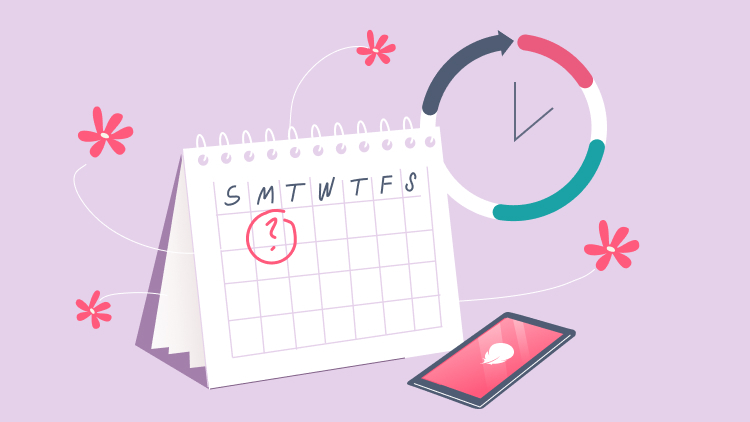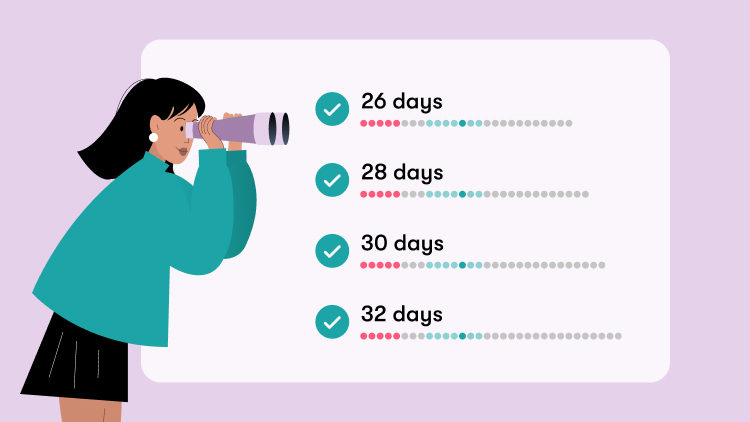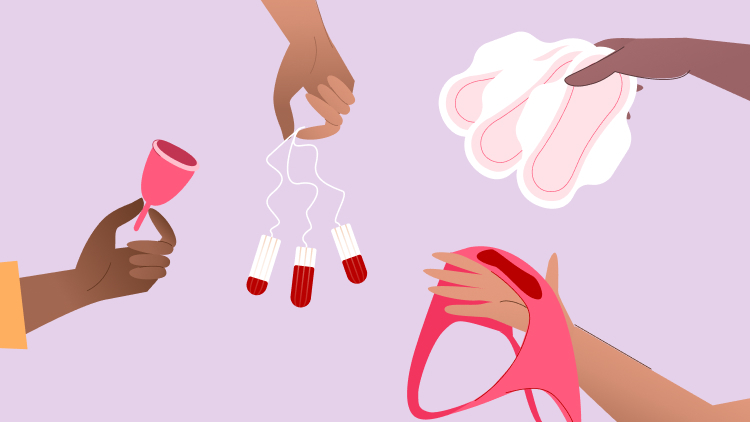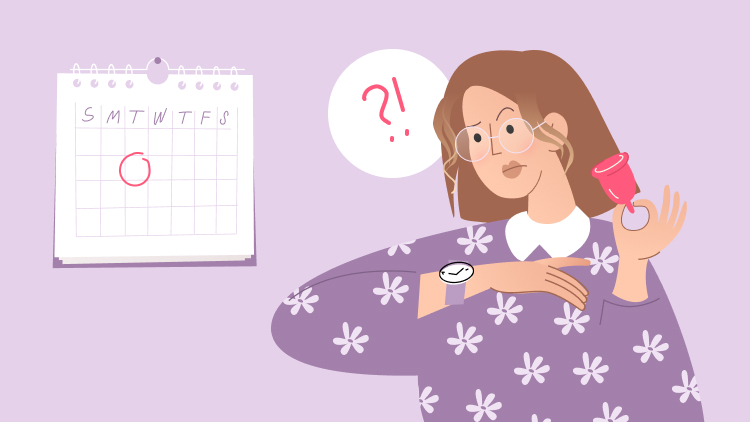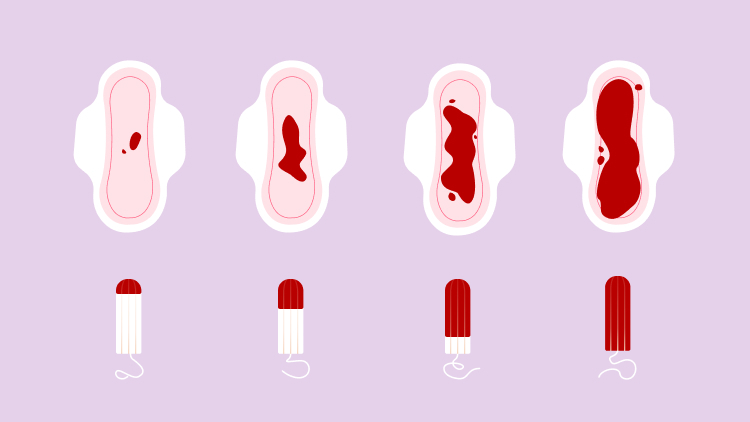Period quiz: How much do you know about your own menstrual cycle?
During reproductive age, the majority of women and people who menstruate have periods every month. But despite that, many of us still have big gaps in knowledge where our menstrual cycles are concerned — which is where our period quiz comes in.
Take this period test and see how much you know about your own cycle. Knowledge is power, after all, and those gaps are there to be filled with some fascinating period facts!
This quiz is designed to help you learn more about your period and periods in general, but it is for educational purposes only. Menstrual periods can differ for every person and can often be irregular. If you’re experiencing irregular periods, uncharacteristically heavy or light bleeding, or notice any other changes to your periods, contact your health care provider for advice.
Start Quiz
What counts as the first day of a new menstrual cycle?
The first day of a new calendar month
9%
The first day of your period
69%
The first day after your period has finished
13%
Whenever — you can decide when your own cycle starts as long as you keep track
9%
Next
Which of the following would be considered an abnormal length of time for a period to last?
Next
What does the word “amenorrhea” mean?
The absence of periods
43%
Having 2 periods in one month
22%
Starting your periods at 8 years old or younger
11%
Next
How long is the average menstrual cycle?
Next
Which of the following is not a sign of heavy menstrual bleeding?
Bleeding that lasts 5 to 7 days
49%
Bleeding that soaks through one or more tampons or pads every hour for several hours in a row
20%
Needing to wear more than one pad at a time
11%
Passing blood clots that are the same size or bigger than a quarter (almost 2.5 cm in diameter)
20%
Next
Which of the following is a cause of amenorrhea in women or people who were previously menstruating (when periods stop for 3 months or more)?
Low body weight (10% or more under normal weight)
16%
Polycystic ovary syndrome (PCOS)
17%
Next
When fully saturated, how much blood can a regular tampon or daytime pad hold?
Next
How many tablespoons of blood does the average person lose during a period?
Next
Irregular periods can be a key symptom of what gynecological condition?
Polycystic ovary syndrome (PCOS)
58%
Next
What color is normal for period blood?
Next
What is one of the most common causes of a light period?
Normal variation in periods
60%
Next
From first period to menopause, how many periods do women and people who menstruate have on average in their lifetime?
Next
{"showCounter":true,"counterAnswers":{"-5":{"questionId":-5,"answers":[{"answerId":1,"count":24}]},"-1":{"questionId":-1,"answers":[{"answerId":1,"count":36}]},"0":{"questionId":0,"answers":[{"answerId":1,"count":172}]},"1":{"questionId":1,"answers":[{"answerId":-5,"count":6},{"answerId":-1,"count":9},{"answerId":0,"count":61},{"answerId":1,"count":4819},{"answerId":2,"count":38389},{"answerId":3,"count":7272},{"answerId":4,"count":5260},{"answerId":9,"count":1},{"answerId":19245075,"count":1}]},"2":{"questionId":2,"answers":[{"answerId":-5,"count":6},{"answerId":-1,"count":9},{"answerId":0,"count":58},{"answerId":1,"count":8610},{"answerId":2,"count":3631},{"answerId":3,"count":8111},{"answerId":4,"count":23242},{"answerId":6,"count":1},{"answerId":67,"count":1},{"answerId":19615098,"count":1}]},"3":{"questionId":3,"answers":[{"answerId":-5,"count":3},{"answerId":-1,"count":6},{"answerId":0,"count":20},{"answerId":1,"count":15899},{"answerId":2,"count":8275},{"answerId":3,"count":8694},{"answerId":4,"count":4037}]},"4":{"questionId":4,"answers":[{"answerId":-5,"count":4},{"answerId":-1,"count":6},{"answerId":0,"count":17},{"answerId":1,"count":3989},{"answerId":2,"count":21820},{"answerId":3,"count":5020},{"answerId":4,"count":2068},{"answerId":5,"count":1},{"answerId":8,"count":1}]},"5":{"questionId":5,"answers":[{"answerId":-5,"count":4},{"answerId":-1,"count":6},{"answerId":0,"count":19},{"answerId":1,"count":14438},{"answerId":2,"count":5861},{"answerId":3,"count":3103},{"answerId":4,"count":5950}]},"6":{"questionId":6,"answers":[{"answerId":1,"count":3921},{"answerId":2,"count":4165},{"answerId":3,"count":2764},{"answerId":4,"count":13861}]},"7":{"questionId":7,"answers":[{"answerId":1,"count":2261},{"answerId":2,"count":8433},{"answerId":3,"count":7880},{"answerId":4,"count":4836}]},"8":{"questionId":8,"answers":[{"answerId":1,"count":1162},{"answerId":2,"count":10828},{"answerId":3,"count":7171},{"answerId":4,"count":3158}]},"9":{"questionId":9,"answers":[{"answerId":1,"count":2904},{"answerId":2,"count":1473},{"answerId":3,"count":12286},{"answerId":4,"count":4626}]},"10":{"questionId":10,"answers":[{"answerId":1,"count":497},{"answerId":2,"count":7235},{"answerId":3,"count":1266},{"answerId":4,"count":11846}]},"11":{"questionId":11,"answers":[{"answerId":1,"count":1097},{"answerId":2,"count":12283},{"answerId":3,"count":2346},{"answerId":4,"count":4720}]},"12":{"questionId":12,"answers":[{"answerId":1,"count":2608},{"answerId":2,"count":5054},{"answerId":3,"count":8274},{"answerId":4,"count":3856}]},"50":{"questionId":50,"answers":[{"answerId":1,"count":1}]},"19947165":{"questionId":19947165,"answers":[{"answerId":1,"count":1}]},"29138781":{"questionId":29138781,"answers":[{"answerId":1,"count":1}]}},"correctTitle":"Correct Answer","noCorrectTitle":"Not really","allIDCorrect":true,"questions":[{"question":0,"correctAnswer":1,"answerDescription":"<p>It\u2019s a period fact you won\u2019t want to forget: The first day of your period counts as the first day of your menstrual cycle. Your cycle lasts until the first day of your period in your next cycle.<\/p>"},{"question":1,"correctAnswer":3,"answerDescription":"<p>A typical period lasts anywhere between 2 and 7 days, with the heaviest bleeding usually occurring in the first 3 days.<\/p>"},{"question":2,"correctAnswer":0,"answerDescription":"<p>Amenorrhea is defined as the absence of periods, which can either be for 3 months or more (where pregnancy is not the cause) in women or people who were previously menstruating or in a young woman who doesn\u2019t get her first period before turning 15 years old.<\/p>"},{"question":3,"correctAnswer":1,"answerDescription":"<p>An interesting period fact is that 28 days is the average length of a menstrual cycle. But everyone is different, and a \u201cnormal\u201d cycle can range anywhere between 21 and 35 days.<\/p>"},{"question":4,"correctAnswer":0,"answerDescription":"<p>The only option above that\u2019s not a sign of heavy menstrual bleeding is \u201cbleeding that lasts more than 5 days.\u201d Bleeding that lasts 7 days would indicate heavy menstrual bleeding, but 5 to 7 days is quite typical.<\/p>"},{"question":5,"correctAnswer":3,"answerDescription":"<p>Low body weight, PCOS, and stress are all possible causes of amenorrhea. No matter what the cause, if your periods have stopped, it\u2019s a good idea to get checked out with your health care provider.<\/p>"},{"question":6,"correctAnswer":1,"answerDescription":"<p>A regular tampon or daytime pad can hold around 5 milliliters of blood. That\u2019s about a teaspoon.<\/p>"},{"question":7,"correctAnswer":1,"answerDescription":"<p>2 to 4 tablespoons of blood is the average amount lost during a menstrual period (between 30 and 70 ml), but some people can bleed a lot more and still be considered within the bounds of a normal period.<\/p>"},{"question":8,"correctAnswer":2,"answerDescription":"<p>Polycystic ovary syndrome (PCOS) is the only condition listed above that\u2019s known to cause irregular periods. Bacterial vaginosis is characterized by vaginal itching, burning when you pee, and green or gray discharge that can have a fishy odor. Thrush is a yeast infection and can cause soreness around the vulva, slight swelling of the vaginal lips (labia), burning or stinging when peeing or having sex, and cottage cheese-like discharge.<\/p>"},{"question":9,"correctAnswer":3,"answerDescription":"<p>A period fact to remember: All of the colors listed are considered normal for period blood. Inside your reproductive system, the blood oxidizes (reacts with oxygen in your body), which means the longer it sits, the darker it gets.<\/p>"},{"question":10,"correctAnswer":1,"answerDescription":"<p>There\u2019s no such thing as being \u201cextra fertile,\u201d and neither food poisoning nor thrush has any known links to impacting periods. It\u2019s totally normal to have fluctuations in the heaviness and length of your period every now and then. Usually, even a period that feels very light for you still falls within the boundaries of a \u201cregular\u201d bleed. That said, if you\u2019re concerned, schedule a checkup with your doctor.<\/p>"},{"question":11,"correctAnswer":2,"answerDescription":"<p>Over the course of their reproductive lives, women and people who menstruate have around 450 periods, which equates to approximately 6 years of nonstop bleeding.<\/p>"}]}
You scored:
Not bad, not bad!
Your body is a complex ever-changing system, and your menstrual cycle can tell a lot about your individual health patterns and overall health.
Did you know that you may experience different symptoms, mood swings, and energy levels depending on your cycle phase?
Regularly keeping track of your period and symptoms can give you a lot of insights about your health and be an important step towards knowing your body better.
Next level of knowledge and insights
Accurate cycle predictions and knowledge of 100+ medical professionals at your disposal.
How Flo can help me?
With over 100+ medical experts, Flo supports women during their entire reproductive lives and provides curated cycle and ovulation tracking, personalized health insights, expert tips, and a fully closed community for women to share their questions and concerns.
Over 240 million people have downloaded Flo, and 48 million people use it on a monthly basis, which makes Flo the most popular women’s health app globally.
Well done, you!
...but there is always more to learn.
Your body is a complex ever-changing system, and your menstrual cycle can tell a lot about your individual health patterns and overall health.
Did you know that you may experience different symptoms, mood swings, and energy levels depending on your cycle phase?
Regularly keeping track of your period and symptoms can give you a lot of insights about your health and be an important step towards knowing your body better.
Next level of knowledge and insights
Accurate cycle predictions and knowledge of 100+ medical professionals at your disposal.
How Flo can help me?
With over 100+ medical experts, Flo supports women during their entire reproductive lives and provides curated cycle and ovulation tracking, personalized health insights, expert tips, and a fully closed community for women to share their questions and concerns.
Over 240 million people have downloaded Flo, and 48 million people use it on a monthly basis, which makes Flo the most popular women’s health app globally.

